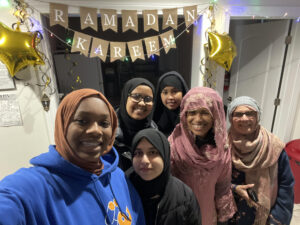Ramadan Mubarak!

Students attend taraweeh nightly prayers at the Hampshire Mosque in Hadley. Pictured with students are Kim Alston, Muslim Student Advisor and Naz Muhammad, Community Relations Coordinator at the mosque.
Muslims worldwide look forward to the start of the Ramadan season, a beautiful time of year for reflection, spiritual renewal, and devotion to Allah. Some of our students and community members at Smith will engage in Ramadan. You will hear many Muslims enthusiastically greet each other with the phrase Ramadan Mubarak or Ramadan Kareem which means Happy Ramadan. A successful Ramadan requires the collaboration of many different centers and departments at Smith, including Dining Services, Residential Life and the Office of Student Engagement, to whom we are thankful for their support every year. CRSL works closely with the leaders of Al Iman, Smith’s Muslim Student Association, to plan events and opportunities for observants.
What is Ramadan?
You who believe, fasting is prescribed for you, as it was prescribed for those before you, so that you may be mindful of God. – Qur’an 2:183 (M.A.S. Abdel Haleem)Ramadan falls in the ninth month of the Muslim lunar calendar and is the time of year when adult Muslims are obligated to fast from pre-dawn to sunset, refraining from food and drink including water; and other specific behaviors. Keep in mind there are always exceptions to the rule and there may be instances when you will notice that some Muslims will not observe the fast for personal reasons. This year Ramadan will be observed from March 10 to April 9, 2024. The actual start date is determined by the sighting of the moon.
Ramadan is an annual sacred period of spiritual renewal and purification for Muslims and involves nightly extended prayers, deep personal reflection, Qur’anic reading (from cover to cover), charitable acts, and community festivities. The Qur’an was first revealed to Prophet Muhammad during the month of Ramadan. Muslims are used to observing Ramadan with their families and communities, so observant students away from home can experience feelings of vulnerability and isolation. Ramadan can also bring on fatigue and stress, which can be challenging to our students.
Community Support for Observants
The CRSL seeks to make extra efforts to respond to student needs by taking steps to validate, acknowledge and normalize Muslim practices. We regularly seek information through surveys and conversations about students’ hopes and needs. Community iftars (breaking of the fast with an evening meal) both on campus and as part of the larger Muslim community are a critical way to support the wellbeing of students observing Ramadan. CRSL and several other Smith departments and centers host iftars and students are encouraged to cook their meals together when they are able. Sometimes students may need to request religious considerations from faculty by way of an absence from class or an extension on an assignment and/or exam. Some students from minority Muslim sects undergo an intensive practice of grief and mourning during Ramadan that adds an additional emotional component to the time period. These students may attend observances at more distant mosques which may require more time for travel.
At the end of Ramadan students may request taking time off to attend the culmination of Ramadan, the Eid celebration, which includes morning prayers at the mosque and a festive community meal.
We cannot emphasize enough how much students appreciate the support they receive from staff and faculty during Ramadan and small considerations can make a tremendous difference to how students experience this holy time. For some students this may be the first time they are responsible for all the details of their Ramadan experience. CRSL reinforces with students the importance of planning ahead and whenever possible providing their professors and supervisors with as much advance notice as possible if a consideration is needed.
Ramadan Resources
- Recording of the CRSL’s Ramadan Awareness Workshop from 2023, with talks by Smith Students and Muslim Leaders from Hartford International University and Williams College) entitled Deeds That Are Beloved to Allah During Ramadan.
- We also encourage you to read the letter written by students to faculty and staff, which includes six ways that you can better support students during Ramadan, on the CRSL blog here.
Student Request Form
If a student makes a request that you, as faculty or staff, would like to consult the CRSL on how to best address, you can notify us here. We want to reiterate that the Center for Religious and Spiritual Life is here for you to consult with on any issues or questions about Ramadan or any of the upcoming religious holidays. We also encourage you to contact the Center for Religious and Spiritual Life directly if you need support to decide on a religious consideration. Lastly, we are using this time as an opportunity to follow up on the letter from the Provost and Dean of the College sent last month to faculty and staff regarding religious observances. Here is a link to Smith’s Interfaith Religious Calendar so you can have access to important information about religious observances.
The beauty of Ramadan is that it is experienced differently by every Muslim and can transform the life and heart of the individual. The CRSL is excited to partner with our students during this blessed time of year. We hope to see many of you at the Interfaith iftar on Thursday, March 28 at 7:00 pm in the Helen Hills Hills Chapel sanctuary.
Peace and Blessings,
Kim Alston, Muslim Student Advisor
Matilda Cantwell, Director of Religious and Spiritual Life
This article represents the beginning of a CRSL series on religious literacy.
